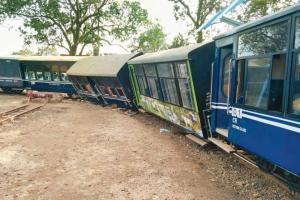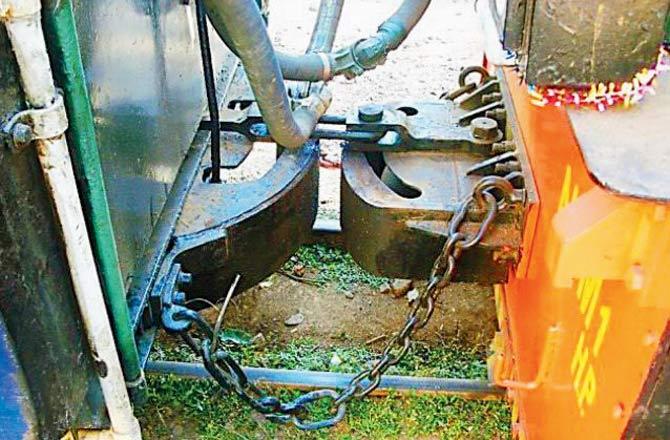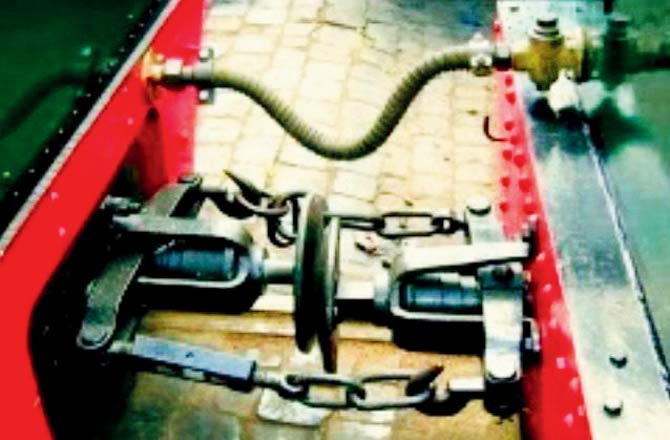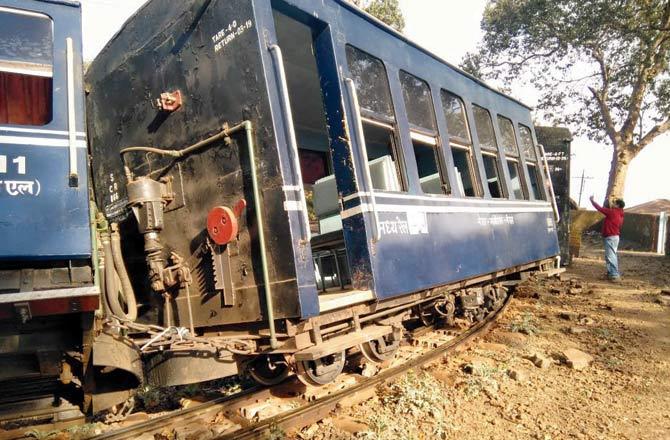Responding to mid-day's reports on the frequent Matheran toy train derailments, international expert Frank Wingler writes to railways saying that the upgraded air brakes are pushing the train off the tracks

The Matheran train derailed as recently as December 31
There may finally be a brake-through solution to the Matheran toy train's repeated derailments, and the answer arrived all the way from the UK. Ever since he experienced an extremely jerky ride on the heritage train in November last year, international railway expert Dr Frank Wingler has been trying to tell the Central Railway that the problem may lie in the outdated brakes and coupling system.
German expert Dr Frank Wingler, who has travelled across the world suggesting ways and means to fix such railway problems, says the iconic narrow gauge Matheran toy train has likely been derailing so frequently because of recent upgrades to the air brake system. He said this might be to blame for the coaches jerking and ultimately going off the rails.
ADVERTISEMENT

International railway expert Dr Frank Wingler compares Matheran train's primitive coupling system
His solution is to go back to the vacuum brake system that was formerly in use on the same train about a decade ago, and is successfully employed by another famous narrow gauge train in the UK (see box). Alternatively, the coupling system can be changed too. Wingler shot off letters to the railway managers in Mumbai, but received no response.
Responding to mid-day's series of reports on the derailments, Wingler said, "Not only are the rails in a poor condition, but the jerks inflicted by the recently-installed, unfavourable dual-pipe compressed air-brake system, and the primitive coupling system from 1904, also add to the derailment risk of the train, especially on down-gradient runs when trailing on curves."

To a more modern solution of vacuum brakes that will absorb shocks and jolts between coaches upon braking
Not conscious uncoupling
When the motorman hits the brakes, inertia sends a jolt through the coaches, and according to Wingler, the toy train's braking and coupling system does not absorb these jerks, leading to a shaky journey. Wingler experienced this jerky movement for himself when he rode the train in November 2018. He recalled, "I had already warned the relevant authorities in 2017 about the increased risk of derailment, but my concerns were not taken seriously. I travelled onboard the train in November and experienced heavy jerks.
"It took three hours and 23 minutes to reach Neral from Matheran. Between Jumma Patti and Neral, the engine developed a technical problem. For the last 3 km, the train had to halt ahead of curves and inclines several times, before we oculd resume the journey. On the last 100 metres, passengers experienced six mega jerks."

Former CR chief Subodh Jain suggested that the problem may lie with the coaches, which are too light and allegedly prone to derailment
Some are sceptical
Subodh Jain, former Railway Board member (Engineering) and ex-general manager of Central Railway, did not agree with Wingler's assessment. Jain said the cause of the derailments is not so much as the coupling system, but the low weight of the coaches, allowing them to fall off the tracks along steep curves. "The weight of the locomotive is more than the total weight of six coaches put together, including the passenger load. Another reason is the difference in the wheelbase of the locomotive and the coaches. Moreover, loco wheels are held rigid with very poor curving behaviour."
He added, "I don't think train is derailing during descent. The air brake system is far more instantaneous and effective as compared to vacuum brakes. A decade ago, the train used to run just fine on vacuum brakes, but the derailments cannot be just because of the shift to air brakes. The train also relies on tramway coupling, but narrow gauge operations at such low speeds always tramway coupling, and not a railway operation."

Dr Frank Wingler
Officialspeak
A Central Railway (CR) spokesperson told this reporter that after the latest spate of derailments — December 31 being the most recent incident — they have initiated a probe and are studying technical aspects of the train. A team from the Research Design and Standards Organisation (RDSO), along with the Indian Railways technical consultant, will study all aspects of the Matheran train. "We are also training staff and improving the working conditions on the line," he added.
Five
No. of derailments in 2018
The British solution
Wingler recommended following the example of another landmark narrow gauge train — the 2-foot NG heritage Ffestiniog Railway in the UK. This train, located in the Snowdonia National Park in Wales, allows the coaches to negotiate tight curvatures thanks to its vacuum brakes and coupling system, which have shock-absorbing properties.
Catch up on all the latest Crime, National, International and Hatke news here. Also download the new mid-day Android and iOS apps to get latest updates
 Subscribe today by clicking the link and stay updated with the latest news!" Click here!
Subscribe today by clicking the link and stay updated with the latest news!" Click here!







